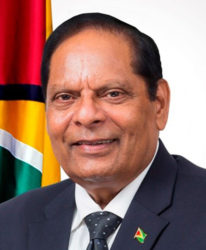Prime Minister Moses Nagamootoo yesterday lobbied scores of Commonwealth magistrates and judges for their support for Guyana’s efforts to resolve its border controversy with Venezuela via a juridical settlement.
At the opening ceremony of the Commonwealth Magistrates’ and Judges’ Association (CMJA) Conference, held at the Marriott Hotel, Nagamootoo emphasised that Venezuela’s claim to Guyana’s territory is a threat to the country as it is positioned on a threshold of a prosperous future.
Nagamootoo delivered the feature address on behalf of President David Granger, who is currently attending the 71st Regular Session of the United Nations General Assembly in New York, where he is also expected to continue Guyana’s campaign for a settlement of the border controversy.

“I have raised this matter with you, our distinguished visitors, because you represent a wide spread of Commonwealth jurisdictions and for our cause we seek your solidarity and support. It is a matter that touches the international rule of law,” Nagamootoo told the more than 200 persons who were seated for the conference, which brings together top judicial officers from the Caribbean, Africa, North America and Europe.
As Nagamootoo provided a historical background to the controversy, he had the attention of those in the room and at one point a “wow” escaped from the lips of one of those in the audience.
“Our oil rich neighbour to the west, Venezuela, is making claim to a significant part of our country, in which huge oil deposits have been found. I do not wish to burden or detain you with the details of the history of this spurious claim, which Venezuela nevertheless offensively and aggressively pursues, save to say that the boundaries between Venezuela and Guyana were identified and settled as a result of the decision of an international tribunal established to do just that since 1899,” he said.
He stressed that it is Guyana’s contention that Venezuela’s aggressive stance towards and its past incursions into our territory are violative of international law and norms.
He added that after 50 years of independence, “Guyana deserves a better life. At last, Guyana is on the threshold of a prosperous and exciting future. We can do without this threat confronting us as a border controversy.”
He reiterated that Guyana is pursuing “settlement by law,” which is among the reasons why President Granger is in New York.
Guyana had written last year to UN Secretary-General Ban Ki-moon to seek a juridical settlement to the controversy. The Secretary-General subsequently dispatched several missions to both Guyana and Venezuela to discuss the way forward.
Guyana’s border with Venezuela was settled by international arbitration in 1899 but Venezuela has continued to claim that this award is null and void and has called for a UN Good Officer process, established by an agreement signed in Geneva in 1996, to be used to settle the controversy.
The process has in the past failed to yield satisfactory results, which has prompted Guyana to seek a juridical settlement.
Since Venezuela issued a maritime decree claiming most of Guyana’s Atlantic waters last year in wake of an oil find by ExxonMobil, Guyana has mounted an intense international campaign to rebuff its claims and establish the need for a juridical settlement.





